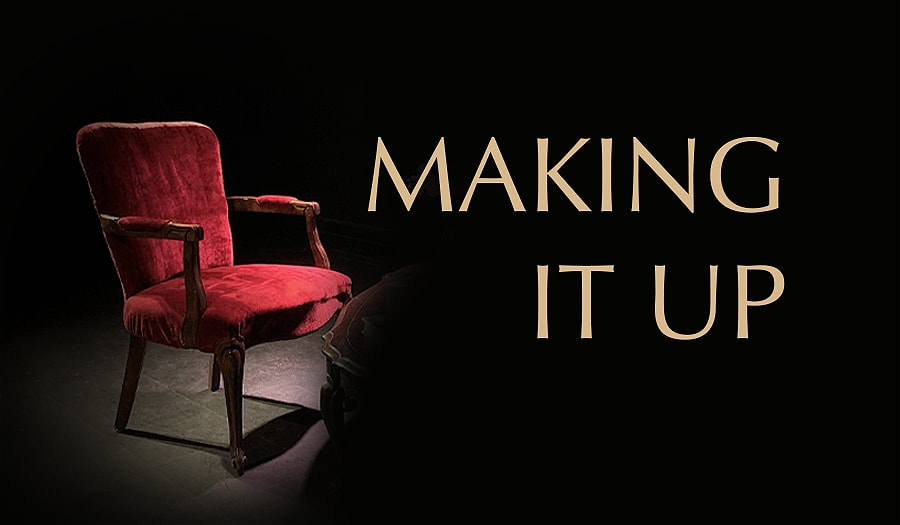Jack McGee
As a work of digital theatre, it’s held back immensely by its craft, and as a play, Reynolds' reverence for his subject matter prevents Making It Up from ever feeling truly introspective. Undoubtedly, the biggest issue is its digital packaging. The direction (Lesley Ballantyne, John Bertram), while ambitious for a low budget work, is frequently disorientating. Efforts to make what is essentially one man talking in a black-box feel more visually dynamic instead end up distracting us from the content. The result is a work that feels overworked, with simple sequences clogged by an abundance of different shots.
It’s admittedly hard to parse how much of the issue is with the direction however, and how much comes down to the editing (Bertram). Making It Up features a wide variety of iMovie-esque transitions. I don’t necessarily believe that crazy spins, wipes, and lens-flare-dissolves are a death knell within themselves (controversially found them great fun in recent film Drive Away Dolls) but they aren’t used to any specific effect here, instead feeling comical and out of place. Similarly to the direction, they pull me out of the story.
Which is a shame, as although Reynolds’ script feels somewhat shallow, his experiences are worth hearing. Like all careers in the arts, Reynolds one is far from linear and its twists and turns are something anyone in the creative industries will relate to. As a fellow devotee of Who’s Afraid of Virginia Woolf? I find his two meetings with playwright Edward Albee compelling in a nerdy way, even if I do bounce off Reynolds’ borderline hagiographic treatment of him. Described by Reynolds as “great” and “the foremost American playwright of his generation”, Albee may as well enter stage-left with angel wings and a halo.
To be clear, I'm not looking for the show to criticise him - what for? - as much as I’m brushing up against how one-dimensional he feels. The stories told about him all have him dispersing good but admittedly somewhat generic wisdom, owning the haters and the theatre-neophytes, and challenging Reynolds to hold himself with respect as a playwright. I don’t come away feeling I know anything new about Albee, other than that he seems like a cool guy, or even his relationship with Reynolds, other than that he was an inspiring figure.
Perhaps if the advice he shared felt richer or more specific, then this show could function more as a playwriting seminar, but it doesn’t. If there’s a message to the show, it’s to respect yourself as a writer; approach your work with craft and diligence, and trust your own judgements. It’s a good sentiment, but it’s not anything any remotely experienced writers haven’t heard, and those who are completely new to theatre likely have little to no interest in Albee. This leaves me questioning who exactly this show is for.
That being said, all of the experiences recounted in the show are described with specificity and communicated efficiently. Reynolds’ walks the walk when it comes to craft, it’s not a shaggy show by any means, running at only half an hour. This choice is both a blessing and a curse. Perhaps with more time Reynolds’ could’ve shaded in some of the gaps here, enriched the show with a greater sense of feeling or meaning. There is the risk however, that in doing so the show loses the strong pace it’s gained in its brevity.
The show does feels deeply personal. Perhaps I am most frustrated with the things it chooses to focus on, because of the deep wells of feeling it frequently skips past. Reynolds has had a difficult and tumultuous career, and while I heavily respect the choice not to turn the work into a therapy session, I wish I am able to experience more of the emotions he went through with him. Maybe seen live, this comes through more in his performance, maybe not.
Ultimately, when being spoken too, from one playwright to another, there are two things I want most. I want to hear how to be better at this thing I love, and I want to feel solidarity and companionship in the trials and tribulations of pursuing this bizarre, under-appreciated craft. There’s a little of both of those in Making It Up. I wish there were a lot.
Making It Up (One Playwright to Another) is available to watch digitally through the Fringe site here






